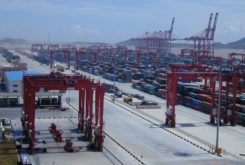Guinea-Bissau’s presence at the 3rd China-Africa Cooperation Forum (FOCAC) in Beijing failed to raise funds for a series of projects it wanted to carry out, President Jose Maria Vaz said on his return to Bissau.
The Guinean president was disappointed that only one of five projects that Guinea-Bissau took to FOCAC to obtain funding was approved. He laid the responsibility on the government of Prime Minister Aristides Gomes.
The Chinese side offered only US $14 million in funding for an unspecified agricultural project, a rice offer valued at US $3 million and its willingness to send a number of medical delegations to the African country.
Visibly aggrieved that he missed this opportunity to get more financial support from China, Jose Maria Vaz said that the failure in negotiations has to do with how the government conducted the contacts, ignoring the importance of the Chinese embassy in Bissau and its ambassador, Jin Hongjun.
The president said he would ask the prime minister to set up a commission, in conjunction with the Chinese embassy, and not directly with the companies, to deal with future support and financing for Guinea-Bissau projects and using the resources of FOCAC available to African countries for the next three years.
The presence of Angola, Cabo Verde, Guinea-Bissau and Mozambique in FOCAC was also marked by a surprise announcement from Angolan Finance Minister Archer Mangueira that Angola owes China US $23 billion.
Archer Mangueira, who traveled to Beijing in President Joao Lourenço’s entourage to FOCAC, gave little information on maturities and interest rates of the debt. To amortise Angola’s debt to China will require the creation of projects that yield a medium- and long-term financial profit.
However, the ambassador of China in Angola, Cui Aimin, had said previously that the Angola’s debt towards his country was “controllable, sustainable and not very bad.”
At the summit, Chinese President Xi Jinping announced a financial package of $60 billion in support for Africa over the next three years, notably through the granting of soft loans, grants and debt forgiveness.
Archer Mangueira did not say whether or not his country would benefit from pardoning at least part of the debt. This is usually granted by China to African countries considered to be less developed or having a weak economic capacity.
Speaking at the summit meeting of FOCAC, the President of Angola defended the increase of direct investment of Chinese companies in the production of consumer goods in Angola. João Lourenço said that this investment should be achieved through establishment of mutually advantageous partnerships with Angolan businessmen, and agreements should include sharing of technology, scientific knowledge and training of Angolan staff.
His Mozambican counterpart, Filipe Nyusi, stated that his participation in FOCAC was “very positive,” and that his country benefited from a pardon of interest-free debt with maturity until the end of 2018, although it did not specify either the amount or the year in which this debt was incurred.
Another gain, said Nyusi, was the country having received a donation of 140 million yuan (about $20 million). Of this, 100 million yuan will be used in development projects and the remaining 40 million the value of a donation of rice.
Mozambique also left Beijing with three bilateral cooperation agreements, technical assistance memoranda to strengthen productive capacity, plant health and structuring cooperation under the “Belt and Road” initiative.
At the same time, public and private entities that travelled to China with the the President signed eight memoranda of understanding in the areas of infrastructure, industry, telecommunications, agriculture and financial services, during a business forum inaugurated by President Filipe Nyusi.
Memoranda were then signed for construction of a road between the province of Niassa in the extreme north-west of Mozambique and Tanzania and the repair of National Road Number 6 linking the city of Beira in Sofala to the border town of Machipanda , in the province of Manica.
Another memorandum signed between the National Road Administration of Mozambique and China Road and Bridge Corporation aims at the construction of a section of road between Pambara in the Vilanculos and Mangungumete district in the Inhassoro district of the southern province of Inhambane.
One of the signed documents calls for the construction of an integrated transport system between the Limpopo Valley and the port of Chongoene in southern Gaza province and industrial parks in Boane and Marracuene in Maputo province. These are part of the memorandum signed between the Ministry of Industry and Commerce and the China Civil Engineering Construction group.
The president of the board of the Confederation of Economic Associations of Mozambique, Agostinho Vuma, admitted that, although “the internationalisation of China is done by public companies,” the Mozambican business community wants to have greater participation in the economic relations between the two countries.
“We are identifying projects that merit funding from the Chinese government. These are important instruments of cooperation with China, as well as public companies and financial instruments, which are making a qualitative leap forward in Chinese direct investment in Mozambique,” he said.
Sao Tome and Principe, a country that participated for the first time in the meetings following the resumption of diplomatic relations with China in December 2016, left Beijing with three cooperation agreements. The first aims at the construction of social housing and road network, the second the entry in the public university of the country of a Confucius Institute and the third a grant of $29 million.
Discussing his visit, Prime Minister Patrice Trovoada said he had received from Xi Jinping a guarantee of support for the Armed Forces of Sao Tome and Principe in infrastructure, training of staff and equipment.
Patrice Trovoada added that the Chinese authorities agreed to finance the redevelopment project for Sao Tome’s international airport as well as the construction of a fishing port.
With regard to Cabo Verde, the President of China assured Prime Minister Ulisses Correia e Silva of his country’s willingness to cooperate with the archipelago’s authorities and also praised the country’s participation in the Belt and Road initiative launched by Beijing in 2013.
Xi Jinping said Beijing pays “special attention” to Cabo Verde’s concerns as a small island country, saying China is willing to strengthen coordination on issues such as climate change and the UN’s 2030 sustainable development agenda.
Cabo Verde is negotiating with China support for development projects, such as the Special Economic Maritime Zone of São Vicente, Cidade Segura (Safe City) and Praia’s National Convention Centre.
Prime Minister Ulisses Correia e Silva announced on his Facebook page that China will donate 140 million yuan (about US $20 million) to Cabo Verde to finance projects in areas to be agreed through diplomatic channels.
The third edition of the China-Africa Cooperation Forum (FOCAC) brought together dozens of heads of state and government from 53 African countries, with new attendants Burkina Faso, Gambia and Sao Tome and Principe.
The first China-Africa Cooperation Forum was held in Beijing in 2006, with the second taking place in South Africa in 2015.



